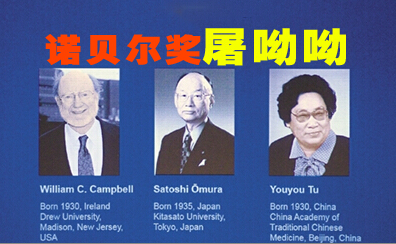The first of this year’s Nobel prizes has been awarded, for medicine, and it has gone to a trio of researchers for work against parasitic diseases.
今年的諾貝爾獎(jiǎng)首先授予醫(yī)學(xué)獎(jiǎng),表彰三位研究人員在對(duì)抗寄生性疾病上作出的貢獻(xiàn)。
The Nobel Assembly of the Karolinska Institute has today awarded the 2015 Nobel Prize in Physiology and Medecine with one half jointly to William C. Campbell and Satoshi Omura for their discoveries concerning a novel therapy against infections caused by roundworm parasites and the other half to Youyou Tu for her discoveries concerning a novel therapy against malaria.

今天卡羅林斯卡醫(yī)學(xué)院諾貝爾大會(huì)頒發(fā)的2015年諾貝爾獎(jiǎng)生理學(xué)或醫(yī)學(xué)獎(jiǎng),一半由威廉坎貝爾和大村智獲得,表彰其在對(duì)抗蛔蟲寄生蟲引起的感染中發(fā)現(xiàn)的新療法。另一半授予屠呦呦,表彰其在對(duì)抗瘧疾上發(fā)現(xiàn)的新型療法。
Youyou Tu’s discovery is perhaps the most remarkable, as a Chinese woman working in China, and using traditional Chinese medical records, she rediscovered an ancient plant-based treatment for malaria that worked where modern therapies failed.
屠呦呦的發(fā)現(xiàn)也許是最為引人注目的,作為一名中國的工作者,根據(jù)中國傳統(tǒng)醫(yī)學(xué)史料,再次發(fā)現(xiàn)一種古老的植物治療瘧疾的療法,現(xiàn)代醫(yī)學(xué)都沒有成功。
Campbell and Omura’s was a more hi-tech approach against the debilitating roundworm, which can decimate cash crops and infect and kill humans almost anywhere in the world.
坎貝爾和大村智則是采用更為高科技的方法對(duì)抗蛔蟲,這中蛔蟲能減少經(jīng)濟(jì)作物,感染并殺死世界上幾乎任何地方的人們。
譯文屬可可原創(chuàng),僅供學(xué)習(xí)交流使用,未接許可請(qǐng)勿轉(zhuǎn)載。











